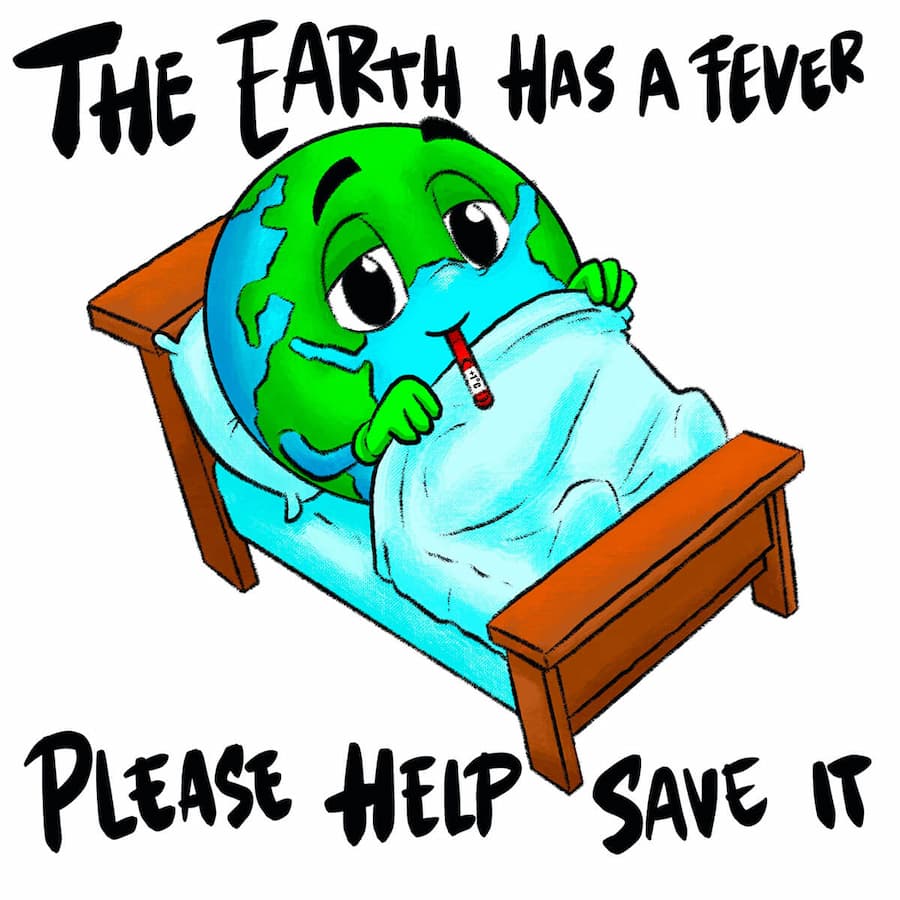Climate Change FAQ
The Climate Change FAQ provides a list of frequently asked questions and links to their answers. This FAQ will be updated over time.
Frequently Asked Questions (FAQ):
What is the difference between climate change and global warming?
What is the difference between climate change and global warming?
Climate change refers to the long-term changes in the Earth's climate, including temperature, precipitation, and weather patterns. Global warming specifically refers to the gradual increase in the Earth's average surface temperature, which is primarily caused by the burning of fossil fuels such as coal, oil, and gas, and the resulting release of greenhouse gases into the atmosphere. In other words, global warming is one aspect of the broader concept of climate change (more info).
How can we help stop climate change?
How can we help stop climate change?
There are several ways to help reduce the effects of climate change and mitigate its causes:
- Reduce greenhouse gas emissions: This can be done by using renewable energy sources such as solar and wind power, and by reducing the use of fossil fuels.
- Increase energy efficiency: By making homes, buildings, and transportation more energy-efficient, we can reduce the amount of energy needed to power them, and thus reduce emissions.
- Plant trees and protect forests: Trees absorb carbon dioxide from the atmosphere, and forests act as carbon sinks.
- Change consumption patterns: This includes reducing meat consumption, eating locally grown food, and reducing waste.
- Support climate-friendly policies: This can include supporting politicians who prioritize climate action and supporting organizations that are working to address the issue.
- Educate yourself and others: By learning more about the issue and sharing that knowledge with others, you can raise awareness and encourage more people to take action.
It's important to note that the actions to combat climate change have to be taken by individuals, organizations, governments, and the international community.
What are the causes of climate change?
What are the causes of climate change?
The primary cause of climate change is the burning of fossil fuels, such as coal, oil, and natural gas, which releases large amounts of greenhouse gases, primarily carbon dioxide, into the atmosphere. These gases trap heat from the sun, causing the Earth's temperature to rise and resulting in climate change.
Other human activities also contribute to climate change, including:
- Deforestation and other land-use changes, which reduce the natural ability of the Earth to absorb carbon dioxide
- Agriculture, particularly the production of meat, which produces methane and nitrous oxide, both potent greenhouse gases
- Industrial processes, which release gases and particles that contribute to climate change
- Transportation, primarily the burning of fossil fuels in cars, airplanes, and ships, which also release greenhouse gases
It is also important to note that natural processes such as volcanic eruptions, solar variations, and ocean currents can also affect the Earth's climate, but the overwhelming scientific consensus is that human activities are the primary cause of climate change.
What are the effects of climate change?
What are the effects of climate change?
Climate change can have a wide range of effects on the environment and on human society. Some of the most significant effects include:
- Rising temperatures: Climate change is causing the Earth's average temperature to rise, which can lead to more heat waves, droughts, and extreme weather events.
- Sea level rise: As the Earth's temperature rises, ice and snow melts, causing sea levels to rise, which can lead to coastal flooding and erosion.
- Changes in precipitation: Climate change can lead to changes in precipitation patterns, including more intense and frequent extreme weather events such as heavy rains, floods and droughts
- More severe storms: Climate change can lead to more severe storms, including hurricanes and tornadoes
- Changes in ecosystems: Climate change can disrupt ecosystems, leading to the loss of species, changes in the timing of seasonal activities such as bird migration, and changes in the distribution of plant and animal species.
- Economic and Social impacts: Climate change can negatively impact economies, particularly those that are dependent on agriculture, fishing, and tourism. It also disproportionately affects vulnerable communities, such as low-income and indigenous peoples, who often have limited resources and infrastructure to adapt to changing conditions.
- Public health impacts: Climate change can cause and exacerbate a range of health problems, including heat stress, respiratory problems, and the spread of disease through insects and pests.
It is important to note that these impacts are interrelated and can exacerbate each other. Additionally, the effects of climate change will vary depending on the region and the specific sector that is being affected.
What is a greenhouse gas? What are some examples?
What is a greenhouse gas? What are some examples?
Greenhouse gases (GHGs) are gases that trap heat in the Earth's atmosphere, leading to the warming of the planet. The most important greenhouse gas is water vapor, however, certain human activities can also lead to the release of other gases that trap heat, these are commonly known as anthropogenic greenhouse gases.
The most significant anthropogenic greenhouse gases are:
- Carbon dioxide (CO2): This is the most important greenhouse gas, and is primarily released through the burning of fossil fuels (such as coal, oil, and natural gas) for energy and transportation.
- Methane (CH4): This is a potent greenhouse gas that is released through activities such as the production of natural gas and oil, and the raising of livestock.
- Nitrous oxide (N2O): This gas is released through activities such as the use of nitrogen-based fertilizers in agriculture and the burning of fossil fuels.
- Fluorinated gases (F-gases): These are a group of synthetic gases that are primarily used in refrigeration and air conditioning systems, and in the manufacturing of certain products. They include chlorofluorocarbons (CFCs), hydrochlorofluorocarbons (HCFCs), and hydrofluorocarbons (HFCs).
Each greenhouse gas has a different global warming potential (GWP) and stays in the atmosphere for different period of time. CO2 stays in the atmosphere for hundreds of years while CH4 stays for around 12 years, but CH4 is 28 times more potent than CO2 over a 100 year period.
What is the greenhouse effect?
What is the greenhouse effect?
The greenhouse effect is a natural process that warms the Earth's surface. When the sun's energy reaches the Earth, some of it is reflected back to space, while the rest is absorbed by the Earth's surface and warms it. The warmed surface then emits heat in the form of infrared radiation. Some of this heat is trapped in the Earth's atmosphere by greenhouse gases, such as water vapor, carbon dioxide, methane, and nitrous oxide, which causes the temperature of the atmosphere to rise. This process is known as the greenhouse effect.
The greenhouse effect is important for life on Earth, as it keeps the planet warm enough for organisms to survive. However, the burning of fossil fuels and other human activities have led to an increase in the concentration of greenhouse gases in the atmosphere, causing the greenhouse effect to become stronger, resulting in global warming and climate change.
It's important to note that the greenhouse effect is not a physical "blanket" that covers the Earth, it is a process that happens in the atmosphere, where the gases trap the heat that would otherwise escape into space, leading to the warming of the planet.
What is the influence of natural cycles on climate change?
What is the influence of natural cycles on climate change?
Natural cycles have a significant influence on climate change. Climate on Earth is influenced by many factors, including natural cycles such as changes in solar radiation, volcanic activity, and natural oscillations of the Earth's climate system.
For example, variations in the Earth's orbit and tilt can cause changes in the amount of solar radiation received by the Earth, leading to changes in temperature and precipitation patterns. These natural cycles, which occur over long periods of time, are responsible for the natural variability in the Earth's climate.
Volcanic activity can also have a significant impact on the Earth's climate. When volcanoes erupt, they release large amounts of gases and particles into the atmosphere, which can block sunlight and cause cooling of the Earth's surface for several years. The effects of volcanic eruptions on climate can be significant, and can have major impacts on global climate patterns.
Finally, natural oscillations in the Earth's climate system, such as the El Niño Southern Oscillation (ENSO), can also have a significant influence on climate. ENSO is a natural phenomenon that occurs in the Pacific Ocean and can cause changes in temperature and precipitation patterns across much of the globe.
While natural cycles have always played a role in shaping the Earth's climate, the current rate of climate change is largely driven by human activities, such as the burning of fossil fuels and deforestation, which are releasing large amounts of greenhouse gases into the atmosphere. These greenhouse gases are causing the Earth's climate to warm at an unprecedented rate, leading to significant changes in temperature, precipitation patterns, sea level, and other aspects of the Earth's climate.
More Info or Suggestions for the FAQ
If you have more questions, visit the contact us page. If you would like us to add a new item on the FAQ, you may contact us as well.
Also, I highly recommend the glossary which will help you find a page with a specific term.
As always, you may use the search bar above.
I hope you enjoyed reading the FAQ and please take the time to visit several other pages on this website.
ChatGPT was used to help create this article
- Home
- FAQ
Join the Community and Newsletter (5000 Subscribers)
You can subscribe to my Substack Page or see the archives of previous posts. More great content coming soon!
Recent Articles
-
Climate Change Guide
Apr 23, 24 12:36 PM
The Climate Change Guide is your guide to a more sustainable future, and will provide you with all relevant information on mankind's greatest challenge. -
Climate Presentations by Climate Reality
Mar 03, 24 12:17 AM
You can see great climate presentations by Climate Reality. They can be customized for different audiences. -
Make the Planet Great Again!
Mar 02, 24 11:33 PM
We need to make the planet great again! We will build a solar wall along the Mexican border and make the fossil fuel industry pay for it! -
Historical Climate Change News
Mar 02, 24 11:25 PM
This section includes historical climate change news you should know about. These articles span several different topics and will help you stay up-to-date.




